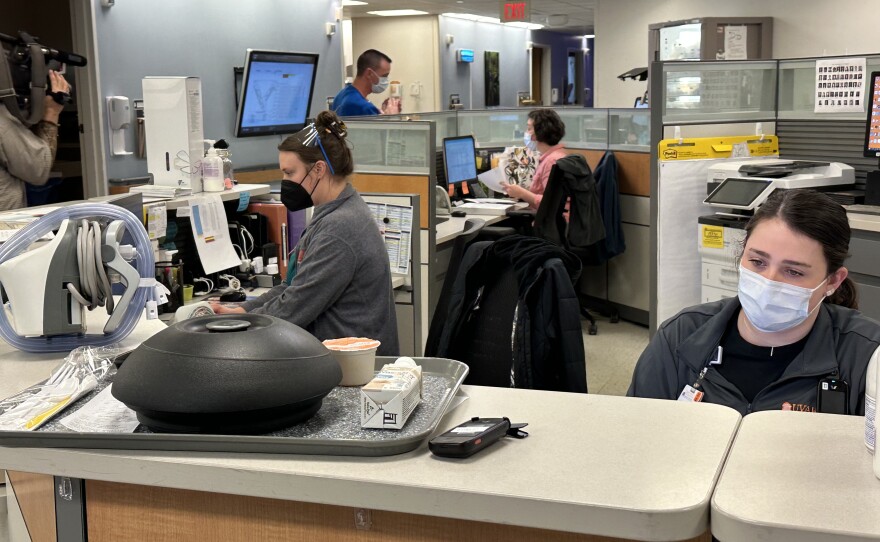Editor’s note: The following story references suicide.
Health care workers were under strain prior to the COVID-19 pandemic, managing long hours, staffing shortages and mountains of paperwork.
The sudden onset of the coronavirus pandemic in March 2020 shined a bright light on those pressures. The health care industry experienced dramatic disruptions during the pandemic, losing more than a million workers between February and April 2020, according to the Bureau of Labor Statistics. Health care employment has since recovered to just above pre-pandemic levels, but shortages persist.
The U.S. is projected to have a shortage of 1.2 million nurses by 2030, according to the Virginia Hospital and Healthcare Association.
A recently released Medscape study found that 53% of the nation’s physicians said they’re “burned out.” The biggest contributing factor to that burnout is time spent on bureaucratic tasks and paperwork.
A group of doctors and health care providers in Virginia are leading the way in addressing the residual effects of overload and exhaustion among care providers.
“There were a lot of early mornings getting up and a lot of late nights,” Scott Austin, a nurse manager at UVA Health, recalled about the early days of COVID. “There was not a lot of time to disconnect from work.”
Austin said his team was feeling strained working long shifts and caring for patients while adjusting to the rapidly changing protocols that came along with an unknown virus.
“[There were] a lot of unknowns. So, that was causing a lot of frustration and irritation amongst a lot of team members,” Austin said. “I needed to become a better leader and have talks with team members in a way that I’ve never needed to do prior to COVID.”
In the health care workforce, there’s a stigma around seeking mental health care.
At the height of COVID, Charlottesville native and emergency room physician Dr. Lorna Breen was working in an overcrowded New York City hospital where fellow doctors and nurses were getting sick and patients were dying at an alarming rate. She told family and friends she was frustrated that she “couldn’t do anything” to help people. She was overworked and stressed. Then, she contracted COVID-19 and her mental health issues worsened. A few months later she died by suicide.
Lorna’s sister Jennifer Breen Feist and brother-in-law Corey Feist co-founded the Dr. Lorna Breen Heroes Foundation to advocate for more mental health care protections for physicians.
“We envision a world where seeking mental health treatment for health care workers is universally viewed as a sign of strength by the workforce,” Corey Feist said.
He said after his sister-in-law's death, he received calls from health care providers from across the country looking for help in addressing the stigma related to mental health care.
“Within the healthcare system, the stigma around taking a break, let alone getting mental health treatments, or speaking to someone about your challenges, is really reinforced from the early days of training,” Feist said.
Breen worried that seeking help could jeopardize her medical license and prevent her from getting future jobs, according to Feist.
The suicide rate among physicians is doubly the general population with an estimated 300 to 400 physician deaths a year in the U.S from suicide.
The Dr. Lorna Breen Heroes’ Foundation mission is to reduce burnout for health care professionals, support seeking mental health services and prevent employers from inquiring about prior mental health issues during the hiring process, which is legal in some states. Feist and other foundation members advocate for laws that fund well-being programs for health care providers.
With guidance from the foundation and the support of Sen. Tim Kaine (D-VA), President Joe Biden signed the Dr. Lorna Breen Health Care Provider Protection Act into law in March 2022. The legislation provided more than $100 million in funding for mental health care for health care providers across the country. Three Virginia health care organizations — UVA Health, Virginia Commonwealth University and George Mason University — received grant funding as part of that law.
At UVA Health, staff has already begun implementing a system called “Care First Aid.”
Richard Westphal, a professor of nursing at UVA, developed the program while working with the U.S. Navy in the early 2000s. He said the approach teaches people how to care for colleagues.
“Like all other forms of first aid, it’s a lay response. It’s what we do first,” Westphal said. “It’s not being a clinician. It’s not being a mental health professional. This is what peers and buddies and friends and neighbors can share with each other.”
Nurse manager Austin, who has been using Care First Aid throughout the COVID pandemic, said it’s given him the tools he needs to support his nursing staff.
“Be aware of yourself and your teammates. Have a conversation with your team or team members,” Austin said. “Then, reach out to your support structures to give them the best help possible.”
Austin also implements a color-coded check-in system that allows team members to communicate how they’re feeling during a shift.
“As a leader, if I see or sense that there’s stress on the unit, myself or the charge nurse can call a quick huddle or a ‘code orange,’” Austin said. “It allows every team member that’s working to pause for a second. Let’s huddle together. Let’s talk about what’s going on.”
It’s the first time Austin could remember having conversations like that with colleagues at the hospital.
At Chesapeake Regional Medical Center, Chief Medical Officer Dr. Ray McCue said dealing with physician burnout has been a longtime struggle.
“One of the challenges when you talk about mental health broadly for physicians is because of their commitment, the responsibility to the patient, that has to come first,” McCue said. “Oftentimes, they don’t have avenues to bring [mental health concerns] forward.”
Virginia’s legislature addressed those issues in 2020 with a safe-haven law that provided confidential resources for health care students and professionals seeking support.
McCue said hospital culture has to change to address mental health issues and burnout.
“You have to eliminate a culture of shame and blame,” McCue said. “And you really have to evolve into a culture of trust and transparency.”
McCue said that shift could lead to a better working environment for care givers and a safer environment for patients.
Corey Feist said ensuring the well-being of health care professionals is as critical as it is for airplane pilots.
“You want your flight crew or your physician or your nurse to be of sound mind and body, be at their best when they’re taking care of you,” Feist said. “And they can’t be at their best in the current set of circumstances.”
Watch VPM News Focal Point weekly on VPM PBS or the PBS app.
Mental health and suicide prevention resources:
In emergency situations, call 988 or 911.
National Suicide Prevention Lifeline: 1-800-273-8255
- Deaf or Hard of Hearing? 1-800-799-4889
- En Español: 1-888-628-9454
Mental Health America of Virginia Warm Line: 1-866-400-MHAV (6428)
- Monday to Friday, 9 a.m. to 9 p.m.
- Saturday, Sunday and Holidays, 5 p.m. to 9 p.m.
- Spanish Services (Friday and Saturday), 5 p.m. to 9 p.m.
- Text/Chat Support (Wednesday, Friday, Saturday), 5 p.m. to 9 p.m.
Veterans Crisis Line & Military Crisis Line: 1-800-273-8255, Press 1
Crisis Text Line: 741-741



